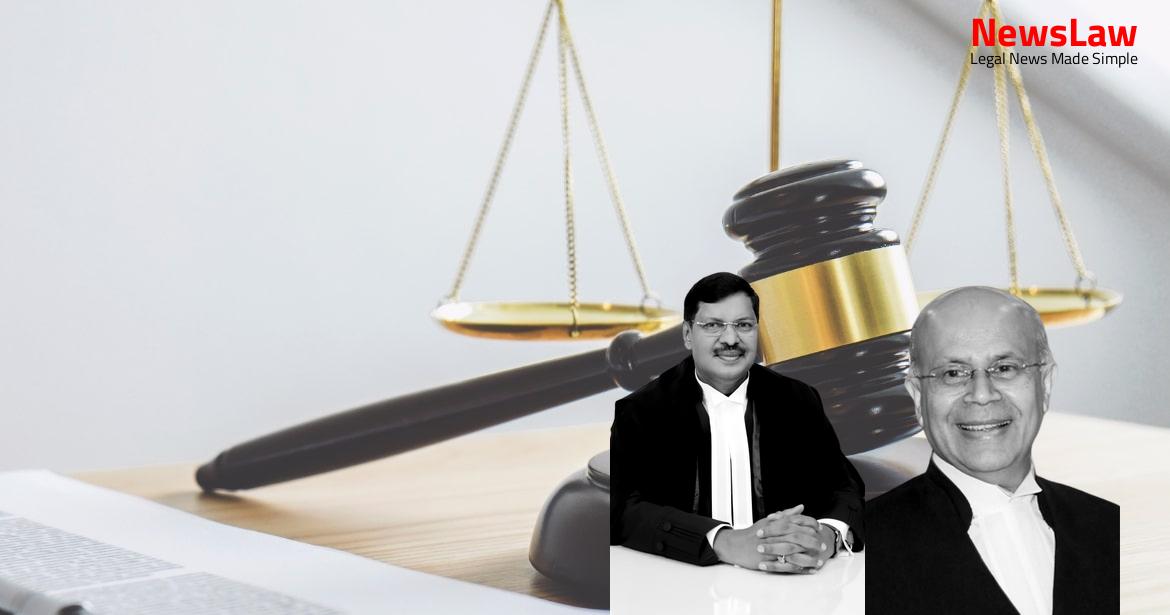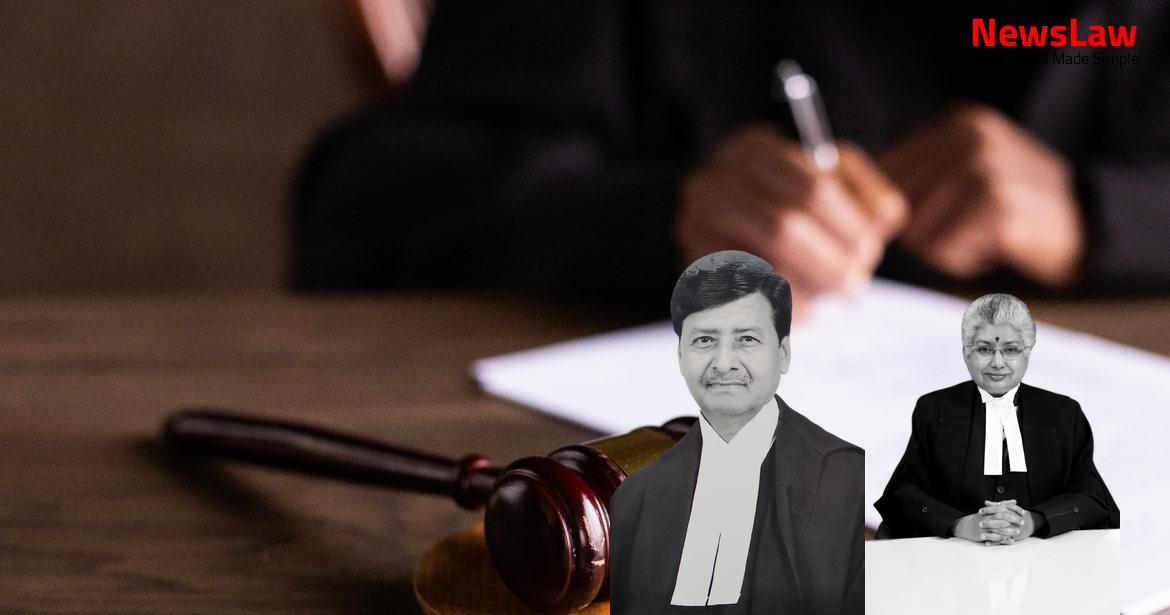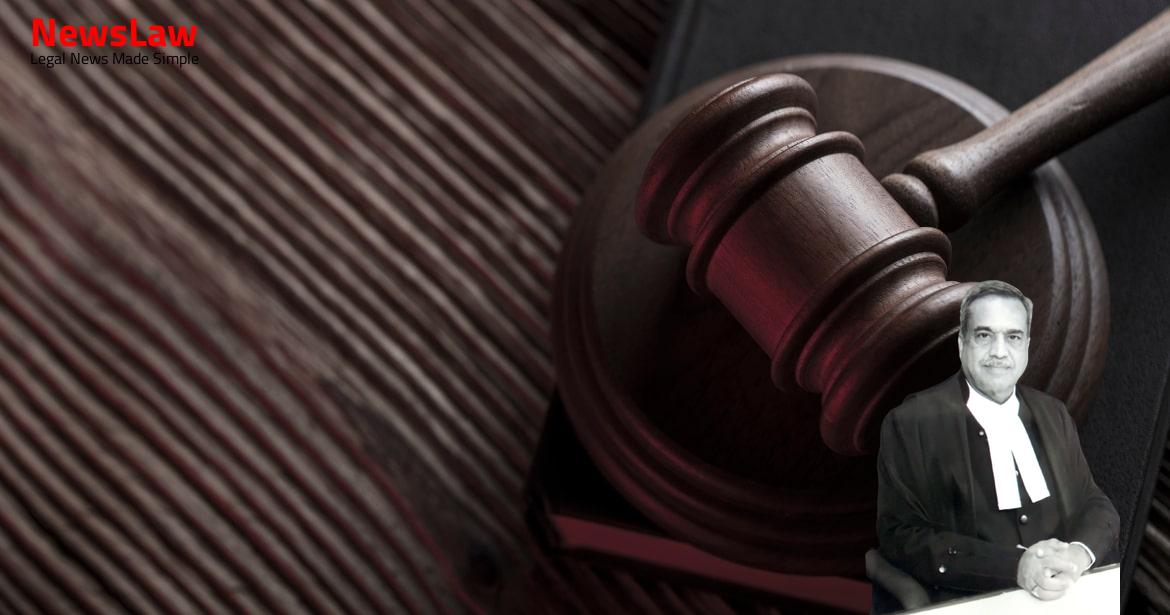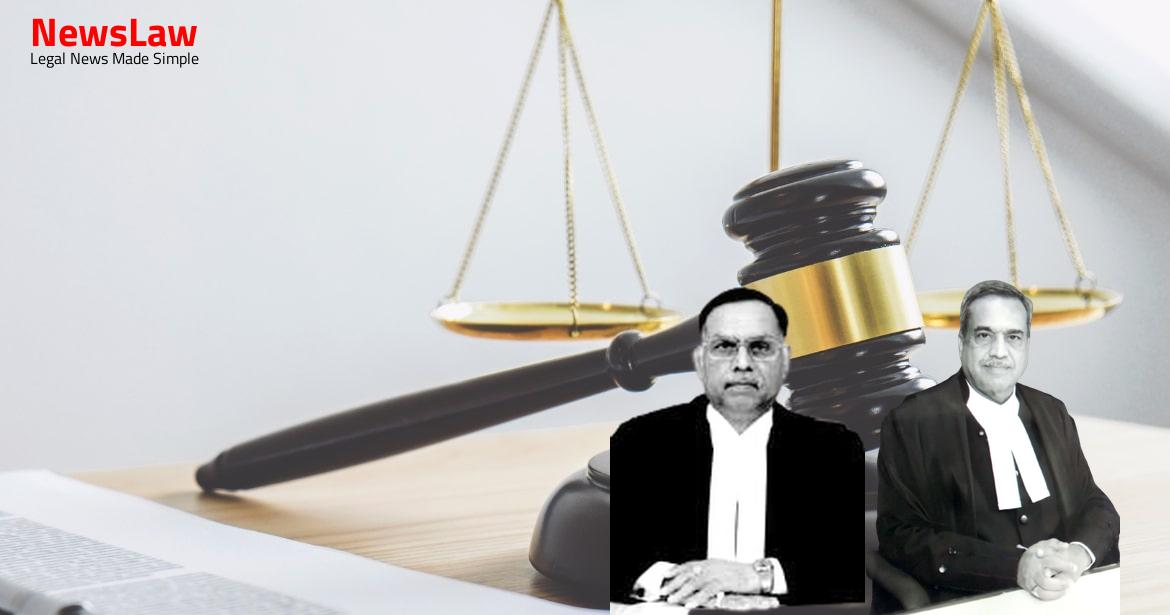A significant legal case recently concluded at the Supreme Court involving Govindappa and Bale Venkataramanappa concerning the enforceability of an agreement to sell land. The judgement carries potential implications for property law and sets a precedent for similar cases in the future.
Facts
- Trial court held the agreement void as it was executed during a non-alienation period.
- Trial court did not frame issue of readiness and willingness of the plaintiff.
- High Court disagreed with trial court’s finding on the agreement being void.
- High Court upheld the first appellate court’s finding that possession was handed over and amount received by the defendant’s father.
- Defendants approached the Court due to disagreement with the decision.
- First appellate court allowed the appeal stating the non-alienation clause did not prohibit alienation.
- Defendants filed Regular Second Appeals due to dissatisfaction with the first appellate court’s judgment.
- The plaintiff Govindappa, son of Bale Krishnappa, filed suit O.S. No 93/1999.
- Bale Venkataramanappa mortgaged the property on 23.04.1990 and executed an agreement to sell within a month.
- R.S.A. No 1925/2008 filed by daughter and wife of Bale Venkataramanappa against an unenforceable agreement.
- High Court dismissed Writ Petition Nos. 22243-22244 of 2011 filed by the plaintiff.
- Bale Venkataramanappa executed an agreement to sell in favor of the plaintiff on 15.05.1990 for Rs. 46,000.
- Trial court held property granted in favor of defendant due to a 15-year bar on alienation as per grant certificate.
- Bale Venkataramanappa received entire consideration amount at the time of the agreement.
- Civil Judge & JMFC issued a notice to which defendants appeared before the Court.
- The premium was paid on 13.09.1983 by Bale Venkataramanappa for the grant with a 15-year non-alienation clause.
- Plaintiff holds power of attorney seeking specific performance of the agreement to sell.
- Limitation defense raised by defendants for a suit filed in 1999 beyond limitations for the agreement to sell.
- Mutation entry in revenue records without notice and challenge by defendants before Assistant Commissioner.
- Plaintiff’s application for mutation after Bale Venkataramanappa’s death in 1997.
- Mortgage deed acknowledges full receipt of mortgaged amount by Bale Venkataramanappa.
- Parallel proceedings before revenue authorities with an appeal allowed in 2008.
Also Read: Land Dispute Resolution: Supreme Court Ruling on Specific Performance
Issue
- The key issue in the present appeals is the enforceability of the agreement to sell dated 15.05.1990 executed by Bale Venkataramanappa in favor of the plaintiff.
- The question at hand is whether the said agreement would be legally enforceable.
- The judgement will determine the correctness of the dismissal of the appellants’ suit based on this issue.
Also Read: Judicial Standards and Compulsory Retirement Case: Supreme Court of India Judgment
Arguments
- Mr. Shailesh Madiyal, counsel for the defendants, argued that the agreement to sell the land was void under Section 61 of the Reforms Act as the predecessor-in-interest could not have transferred the land.
- He supported the trial Judge’s decision and criticized the interference by the first appellate court.
- He further contended that the High Court also erred in upholding the first appellate court’s finding.
- Bale Venkataramanappa received the entire consideration and handed over possession as per the agreement to sell.
- Pleadings in the plaint were not contested by filing a written statement or leading evidence.
- First appellate court and High Court justified in decreeing the suit based on uncontested facts.
- Appellants argued that the doctrine of ex dolo malo non oritur actio should apply.
- Appellants emphasized the maxim of nemo allegans suam turpitudinum audiendum est.
- Respondent argues that the agreement to sell, though made during the 15-year restriction period, becomes enforceable once the period is over.
Also Read: Supreme Court Judgement in a Criminal Case
Analysis
- A sub-lease of the whole or any part of the holding of a Pakka tenant properly and legally prior to the commencement of the Act shall terminate after the expiry of the period of sub-lease or 4 years after the commencement of the Act, whichever is less
- No land granted to any person under the Reforms Act shall be transferred within 15 years from the final order passed by the Tribunal, except for partition among joint family members
- A registered occupant or successor-in-title can take a loan against the land for development, agricultural practices improvement, or educational purposes
- Transfer or partition of land in contravention of the Act shall be invalid, and the land shall vest in the State Government
- Default in loan payment can lead to attachment and sale of the interest in the land to pay off the loan
- Sub-lessee not handing over possession after sub-lease termination shall be deemed a trespasser and liable to ejectment
- It is established that a party is not estopped by a deed from avoiding it if it was executed for a fraudulent, illegal, or immoral purpose.
- The case law and principles of public policy dictate that illegality in a transaction may result in the dismissal of a claim, unless it is trivial or venial, and the plaintiff can base their claim on other grounds.
- Courts of equity will not grant relief in cases involving illegal agreements or transactions where both parties are at fault, following the maxim in pari delicto potior est conditio defendentis et possidentis.
- The Court will not lend its aid to a plaintiff if the cause of action arises from an illegal act or goes against public policy, as per the maxim ex turpi causa non oritur actio.
- The Court evaluates whether the illegality goes to the root of the matter, and if the plaintiff cannot bring the action without relying on the illegal transaction, the claim may be dismissed.
- If the illegality is clear and not required to be part of the cause of action, the defendant’s plea should not prevail unless it outrages the conscience of the Court.
- Various authorities and judgments have discussed the application of maxims such as ex turpi causa non oritur actio and in pari delicto potior est conditio defendentis et possidentis in cases of illegal transactions.
- Exceptional cases and supposed exceptions to the rule of turpi causa have been mentioned, but the trend is towards leaving the parties where they are found when claims arise from illegality.
- The Court has to carefully consider the circumstances and rules laid down by authorities when applying these maxims in determining the outcome of cases involving illegal transactions.
- Sub-section (1) of Section 61 of the Reforms Act makes any transfer in violation invalid.
- Court can dismiss the action under maxim ex turpi causa non oritur actio.
- Court can allow plea of fraud to be raised for enquiry on mutual fraud.
- Legislative intent of Section 61 is clear with a 15-year prohibition on transfers.
- Both parties equally guilty in violating the law in the transaction.
- Court allowed possession to remain with the party where it currently lies.
- Decision of the Court conditioned by public policy considerations.
- Confederates in fraud not permitted to obtain decree from the Court.
- Both parties equally guilty in the fraud carried out.
- Assistance in retaining possession is purely passive in nature for the Court.
- Signatures made without consent for application in names of others.
- The court’s assistance should be of a passive nature, not actively enforcing illegal agreements.
- Granting a decree based on an illegal agreement contradicts the law and is against public interest.
- If the balance of justice tilts towards the defendants benefiting from an illegality, it is less injurious to public interest.
- Both parties participating in the illegality are equally responsible.
Decision
- The appeals have been allowed and quashed
- The order dismissing the suit by the trial court is upheld
- Judgment and order of the High Court of Karnataka dated 08.06.2015 is set aside
- Order of the Fast Track Court-III, Bangalore Rural District dated 17.06.2008 is set aside
- Each party will bear their own costs
Case Title: NARAYNAMMA AND ANR ETC ETC Vs. GOVINDAPPA AND ORS. ETC ETC
Case Number: C.A. No.-007630-007631 / 2019



